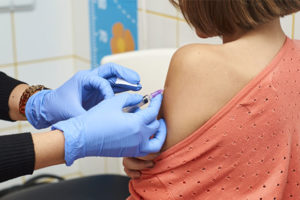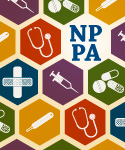June 15th, 2017
Educating Patients About HPV Vaccination Can Feel Like Peddling Snake Oil
Elizabeth Donahue, RN, MSN, NP-C
Messaging and medicine have always gone hand in hand. A Google search for wellness products of yesteryear produces a vibrant collection of ads for lotions and potions. Cod liver oil, hair tonics, and other extracts (including opium!) were promised to keep you feeling healthy and looking great. And using medical professionals to bolster product claims has long been popular in marketing. Even big tobacco companies used physicians in their print ads, citing doctors’ preference for a certain brand of cigarettes, or proclaiming one type “more filtered” or “less irritating” than the next. How effective they must have been!
Of course, these advertisements came at a time when consumers had less access to information. Now patients can see a list of ingredients, read a statistical analysis of outcomes, and rely on FDA and CDC data. Rules around advertising and claims about medicines have changed drastically. So why, in 2017, does it sometimes feel like I am peddling snake oil?
 I particularly feel like this when it comes to recommending the HPV vaccine. Attending a lecture last week, I was relieved to hear that other providers feel similarly. The talk was given by an expert in STD prevention and treatment. As the conversation around HPV turned to the vaccine, and we were reminded of indications, insurance coverage, and other practical pearls, one pediatric NP asked others to share techniques they found successful in convincing parents to vaccinate their children. To be clear, low HPV vaccine uptake isn’t a case of anti-vaxxers refusing the intervention as part of an overall philosophy; rather, HPV vaccine refusal is repeatedly found in practice among a staggering number of patients and families who do opt for other vaccines. In my internal medicine setting, I see adult women, previously unvaccinated and about to age out of coverage, continuing to decline the vaccine. They do so because they recall their mothers declining it on their behalf during a shared office visit 10 years earlier.
I particularly feel like this when it comes to recommending the HPV vaccine. Attending a lecture last week, I was relieved to hear that other providers feel similarly. The talk was given by an expert in STD prevention and treatment. As the conversation around HPV turned to the vaccine, and we were reminded of indications, insurance coverage, and other practical pearls, one pediatric NP asked others to share techniques they found successful in convincing parents to vaccinate their children. To be clear, low HPV vaccine uptake isn’t a case of anti-vaxxers refusing the intervention as part of an overall philosophy; rather, HPV vaccine refusal is repeatedly found in practice among a staggering number of patients and families who do opt for other vaccines. In my internal medicine setting, I see adult women, previously unvaccinated and about to age out of coverage, continuing to decline the vaccine. They do so because they recall their mothers declining it on their behalf during a shared office visit 10 years earlier.
But here’s the thing about the HPV vaccine — it really DOES do what it is supposed to. And what it is designed to do is a pretty big deal — preventing a virus that we know causes cancers. We have no other tool in our arsenal that actively prevents cancer in this way. We can reduce our risk through behavior avoidance and early screening for several of the most prevalent cancers, but this vaccine prevents the development of disease.
One commonly cited barrier to vaccine uptake is stigma about the sexual nature of HPV. HPV vaccines prevent disease transmitted through sexual contact. Anecdotally and from research findings, we often hear that parents resist because they are uncomfortable talking about the sexual health of their young children, or because they reason that it will lead to increased or earlier sexual activity (see this JAMA commentary). The data I have seen support the vaccine on those counts; in this cross-sectional study and this review, for instance, authors found no evidence of changes in sexual behaviors in vaccinated groups when compared with their non-vaccinated peers.
 As for possible solutions, some experts suggest desexualizing the conversation – pointing to non-sexual routes of HPV transmission and non-genital cancers. Another possibility might be to consider nontraditional settings for vaccine education and administration. For instance, school-based anti-HPV programs in Australia include non-compulsory vaccine days that have resulted in coverage of more than 70% of the targeted adolescent female population and are already showing decreases in infections and cervical abnormalities. An extension of the program to adolescent males has also demonstrated success.
As for possible solutions, some experts suggest desexualizing the conversation – pointing to non-sexual routes of HPV transmission and non-genital cancers. Another possibility might be to consider nontraditional settings for vaccine education and administration. For instance, school-based anti-HPV programs in Australia include non-compulsory vaccine days that have resulted in coverage of more than 70% of the targeted adolescent female population and are already showing decreases in infections and cervical abnormalities. An extension of the program to adolescent males has also demonstrated success.
Since attending that lecture, I have come to see the conundrum more clearly. I think that I had taken on my patients’ reticence to the vaccine by osmosis, which was negatively affecting my communication. I was almost apologetic when bringing up the vaccine recommendation and as a result was presenting my customers with a “soft” sales pitch. I would start off with something like, “I understand your concerns, but…” And when they would decline, I would leave the room wondering why I hadn’t closed the deal, while my rational brain was still screaming about the power of prevention, the data, the efficacy! I now realize that negative patient views of the HPV vaccine had subtly affected my approach – made me timid in my discussion and gave validation to their concerns, weakening my argument from the start. Now I am more adamant, I go in for the close right away: Here are the studies, the vaccine works, now let’s get down to business.
If you’ve found a successful approach to convincing hesitant patients or parents of the HPV vaccine’s importance, I’d love to hear about it. Please share it in the comments below.




The Scottish government claims that “there has been a 90% reduction in HPV since the vaccines were introduced in 2008”. WRONG – there ‘claim’ should read that there has been a reduction in HPV strains 16 & 18 but what about all of the other strains that are taking their place?
Their own cervical cancer stats on the ISD webpage show a 4 FOLD INCREASE in cervical cancers for the 20-24 age group in the last 3 years reports (2012-2014). With a catch-up programme in 2008 for girls up to 18 which was completed by 2009 most of the girls in this age group by 2014 should have been vaccinated.
Furthermore the ‘all-age’ stats. throughout the 1990’s was rapidly reducing as Pap screening approached 80% and, if that improvement had continued, cervical cancer could have been eliminated by by 2019. Instead they switched the priority to vaccination, screening has come down and cancer rates have increased! Smacks of negligence to me.
There is a legal requirement for health professionals to provide INFORMED consent. How can they do this when they themselves are NOT informed, or should I say ignorant?
There is ZERO evidence that Cervarix and Gardasil will ever prevent a single case of cancer. The manufacturers, GSK and Merck, only ever state they are ‘intended to’ or ‘expected to’.
Cervarix is expected to prevent 2 strains of HPV, Gardasil 4 strains and Gardasil9 9 strains but there are over 170 strains of HPV with at least 40 involved in cancers but scientists expect other strains, potentially more lethal, to take the place of those which might be prevented by the vaccines. See Sonja Fischer peer-reviewed article ‘Shift in prevalence of HPV strains post vaccination’.
The World Health Organisation has a database of adverse drug reports at vigiaccess.org. There are over 167,900 adverse reactions in almost 73,000 reports of adverse events with this vaccine, including 280 deaths, WHO also acknowledges only 10% get reported.
What is worse there have been several reports of VACCINATED girls as young as 18 developing cervical cancer.
I would think a mom would be more comfortable discussing HPV if you take her to a room without the child and present her with stats demonstrating the likelihood that her child will eventually be having sex and thus needs protection from infertility and the stress that comes with fertility treatments.
I take it that Steve Hinks is an antivaccine, antiscience activist, determined to report misleading or inaccurate facts in order to put as many people off as possible. What he writes is nonsense, of course, not worth the effort of debunking.